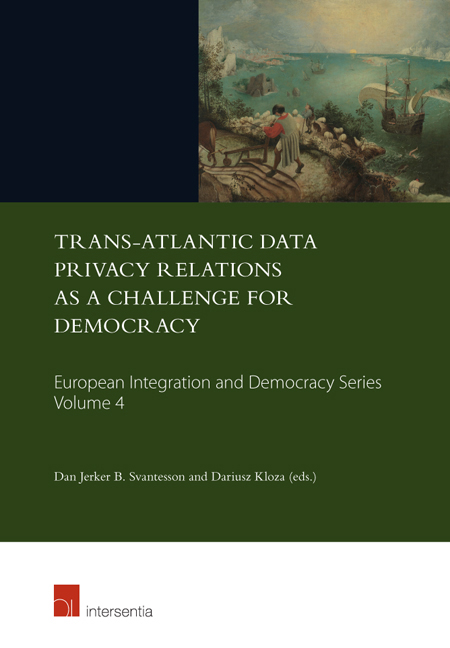Book contents
- Frontmatter
- Foreword
- Preface
- Contents
- List of Abbreviations
- PART I PRIVACY AND …
- SECTION I PRIVACY AND TRANSBORDER FLOWS OF PERSONAL DATA
- INVITED COMMENTS
- SECTION II PRIVACY AND INTERNATIONAL TRADE
- INVITED COMMENT
- SECTION III PRIVACY AND TERRITORIAL APPLICATION OF THE LAW
- SECTION IV PRIVACY AND CRIME
- INVITED COMMENTS
- SECTION V PRIVACY AND TIME INVITED COMMENTS
- PART II THEORY OF PRIVACY
- PART III ALTERNATIVE APPROACHES TO THE PROTECTION OF PRIVACY
- INVITED COMMENT
- CONCLUSION
Foreword
Published online by Cambridge University Press: 29 September 2018
- Frontmatter
- Foreword
- Preface
- Contents
- List of Abbreviations
- PART I PRIVACY AND …
- SECTION I PRIVACY AND TRANSBORDER FLOWS OF PERSONAL DATA
- INVITED COMMENTS
- SECTION II PRIVACY AND INTERNATIONAL TRADE
- INVITED COMMENT
- SECTION III PRIVACY AND TERRITORIAL APPLICATION OF THE LAW
- SECTION IV PRIVACY AND CRIME
- INVITED COMMENTS
- SECTION V PRIVACY AND TIME INVITED COMMENTS
- PART II THEORY OF PRIVACY
- PART III ALTERNATIVE APPROACHES TO THE PROTECTION OF PRIVACY
- INVITED COMMENT
- CONCLUSION
Summary
The dawn of the second decade of the twenty-first century has forced lawyers to rethink some widely used yet basic concepts in order to extract the fundamental rights principles from the flood of European legislation generated since the European Union really begun its operation in 1993 At the same time, legislators have been bombarded with the question of legitimacy of some European legal concepts in the new century For instance, while the whole concept of personal data seems to be solid enough to survive even strongest attacks, some particular elements of the legal heritage of Directive 95/46/EC of the European Parliament and of the Council of 24 October 1995 on the protection of individuals with regard to the processing of personal data and on the free movement of such data, are still being strongly questioned.
Among many trans-Atlantic data privacy aspects, this book examines the many questions concerning the classic concept of restrictions of personal data transfers beyond the area considered, from a European viewpoint, as safe This concept is illustrative to the whole spectrum of trans-Atlantic relations and I would like to offer a few remarks on this matter It is furthermore essential, on the road to global interoperable schemes of personal data protection, to answer questions of international transfers and their influence on international trade, big data processing and new roads to cybercrime.
Under the Lisbon Treaties, which have been in force since 2009, the European Union regards itself as a distinct political entity, not a federation of Member States, held together – as Luuk van Middelaar says – with a ‘unique, invisible glue’ This connection is grounded with shared goals One of them – expressed both in the Treaty on the Functioning of the European Union (Art 16) and in the Charter of Fundamental Rights of the European Union (Arts 7 and 8) – is a unique obligation to protect personal data Stating that everyone has the right to the protection of personal data concerning them, the European Union feels obliged to observe how safe is the data both held in its territory and transferred outside thereof.
- Type
- Chapter
- Information
- Publisher: IntersentiaPrint publication year: 2017

